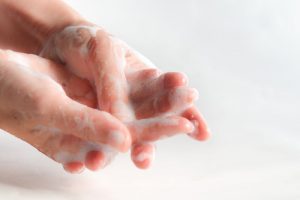If I say “hey” and smile, I’m genuinely glad to see you. But I’m not going to shake your hand. 
Greeting my friend Tom, a Gastonia lawyer in court this morning, I offered him an “elbow bump.”
He at first looked quizzically at me, then quickly bumped elbows saying:
That’s right. Coronovirus. This courthouse is a literal petri dish.
I’m actually paraphrasing Tom.
His descriptions tend to be both funny and colorful.
It’s one reason I like Tom so much.
It’s also a more than fair description of the courtrooms and courthouses in the Charlotte-Metro region.
Should I go to court if I’m sick?
Criminal charges in North Carolina often mandate in-person court appearances to answer the charges.
That’s true for many if not most felony charges, DWI charges, and even a good number of misdemeanors in District Court.
Defense lawyers may, in limited circumstances, obtain a Waiver of Appearance.
That’s a common practice for speeding tickets, traffic citations, and other waivable matters.
How is Court Scheduled in North Carolina?
Appearing “in abstentia” (in the absence) of the client isn’t always an option.
While some might not like to admit the harsh but accurate truth, this criminal defense lawyer will lay it out there.
A lot of people come to court when they’re sick.
And a lot of those sick people are very contagious.
In some instances, we defense lawyers are for all intents-and-purposes required to share some tough advice:
You better come to court or the Judge may issue an Order for Arrest.
Even this old courtroom salt has attended a session of court when more than a bit under the weather.
We all feel the pressure of our professional and personal commitments.
If you’re sick, call your lawyer. Given what we’re all going through right now, I personally plan on asking about court appearances for potentially contagious clients – Bill Powers, Charlotte Criminal Defense Lawyer
The key is timing.
We recommend calling well in advance of your court appearance if that is possible.
For the record, there are very good reasons defendants are required to come to court.
Unfortunately, too many people facing charges have in the past “cried wolf.”
They miss court, making up excuses, without good cause.
Experienced criminal lawyers suffered through errant fire alarms and the time-consuming clearing of the courthouse facility.
More than one ambulance has been summonsed in the pathetic attempt to avoid an appearance, a calendar call, or the entry of judgment with an active prison sentence.
That happens more than you might think.
When is Court Closed?
Wasting valuable court time understandably causes back-ups and frustrated judges, prosecutors, police officers, clerks of court, and defense lawyers.
Assuming the COVID-19 outbreak reaches pandemic proportions, it’s reasonable to now ask:
During this time when people are literally dying from exposure to a virus, how and when will the court system formally address the likely issues involving appearances?
At what point will the Courts allow absences without the issuance of legal process? (Orders for Arrest and/or Failures to Appear for nonappearances)
How bad does it have to get before Court closes?
When will we stop shaking hands?
Shaking hands in the era of the Coronavirus does not make sense.
The handshake is purportedly a Greecian custom dating five hundred years before the birth of Christ (5th century B.C.).
Showing neither party carried a dagger or knife, shaking hands was adopted as a custom of peace and personal safety.
In the United States, a “good handshake” is one that is firm and coupled with straightforward eye contact.
So much for looking out for weapons.
What’s an “Elbow Bump?”
Studies indicate high fives and fist bumps transmit fewer germs than the traditional handshake.
Given a general propensity for germophobia, I’ve been “elbow bumping” for years.
My elbow never touches my mouth, nose, or eyes.
I don’t open doors with my elbow.
I don’t pick up objects with my elbow.
And I assume no one else does either.
As such, it seems apparent my elbow is possibly the least likely surface to allow for the transmission of H1N1, Ebola, the flu, the Coronavirus, or Tuberculosis for that matter.
While I’d prefer to wave or just say “hello,” some people like the tradition of physical touch.
Wash your dang hands 
Dr. Ignaz Semmelweis began washing his hands in chlorinated lime water in 1846.
Had others in the medical profession followed suit, countless lives would have been saved well-before the antibiotic era.
Indeed, Semmelweis eventually lost his job for sharing the truth about infections and infectious diseases.
According to the U.S. Centers for Disease Control and Prevention, health-care providers wash their hands about 1/2 as much as they should.
If more than 40% of doctors don’t wash their hands, why would anyone expect the general public to be any better at the practice?
That may change and that right soon.
Realizing there are only so many face masks available, people may begin washing their hands on a regular basis.
20 seconds of thorough hand-washing, with soap and warm water, is thought to effectively eliminate many if not most viruses, flu bugs, and the Coronavirus.
So, wash your dang hands.
 Carolina Criminal Defense & DUI Lawyer Updates
Carolina Criminal Defense & DUI Lawyer Updates